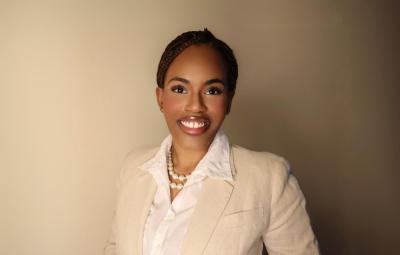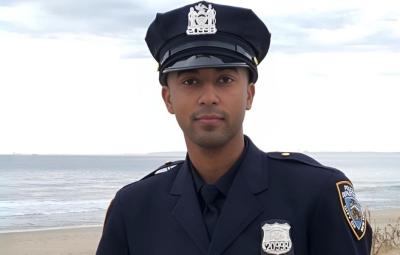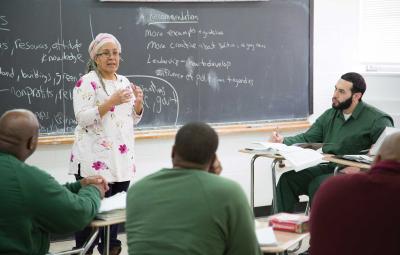![left to right) Karol V. Mason, Benjamin B. Tucker, Isaac Bryan, Gloria Browne-Marshall, David Kennedy ]](/sites/default/files/media/news/racialjustice_storynew.jpg)
In an effort to examine how we should be educating our future leaders, educators, public servants, and law enforcement, on August 27, the John Jay community convened a diverse panel of leaders to reflect on where we are six years after the death of Michael Brown. This event was part of our ongoing Racial Justice Series, which was created in response to the senseless deaths of George Floyd and Breonna Taylor, and made all the more critical in light of the recent events in Louisiana and Wisconsin. Throughout these discussions our community aims to explore difficult issues surrounding racial justice and find common ground regarding public safety. “As a community focused on issues of justice, we’re committed to providing a space to explore these complicated issues,” said John Jay President Karol V. Mason. “Our goal is to seize this moment in history and promote lasting change.” Mason hosted a panel that included: Benjamin B. Tucker ’77, New York Police Department First Deputy Commissioner and John Jay alumnus; Isaac Bryan, Director of Public Policy at the Ralph J. Bunche Center for African American Studies at the University of California, Los Angeles; Gloria Browne-Marshall, John Jay Professor of Constitutional Law and a civil rights attorney; David Kennedy, Director of the National Network for Safe Communities at John Jay, and a criminologist. Almost 300 attendees joined the event, offering questions that Mason incorporated into the topics that she posed to the panel. Here are some of the most insightful and stirring moments of the evening.
Staying Optimistic
After the unrelenting string of painful events that our country has recently witnessed, Mason told the audience that she understood the impetus to feel hopeless or helpless in regards to race relations in America. “It would be easy for us to shake our heads and hope that someone else provides the solutions to these problems, but the fact that you’re here tonight, over 250 people, that’s what gives us the optimism to go on,” said Mason. “We’re all committed to doing the hard work in dealing with these issues. Tonight, we’re going to discuss the intersections and implications of our country’s complicated history on race and law enforcement.”
“To truly advance the cause of racial justice, we need to fully acknowledge where we’ve been and recognize how we got where we are today.” —Karol V. Mason
She went on to say that our intent was to examine the efforts that have been made to create trust between law enforcement agencies and communities of color, and to build on those positive interactions. Her hope for the collective community was to chart a path forward in public safety, but continued by saying, “to truly advance the cause of racial justice, we need to fully acknowledge where we’ve been and recognize how we got where we are today. Because the only way to shape our future is by understanding our past.” She told the audience that she wanted this to be a pivotal moment in our country’s history. Tucker took that sentiment a bit further by saying, “I would suggest that it has to be a pivotal moment where we take the reins and figure out what efforts are needed for us to come to grips with the challenges that we are facing and the lives that we’re losing. We don’t have a choice in that regard.”
Experiencing the Problem
Like many Black people, Bryan could look at the situation not only as a scholar on African-American history, but also as a person whose humanity and dignity had been ignored. “I’ve been pulled over unnecessarily. I’ve been pulled over at gunpoint. I’ve been asked to step out of the car. I’ve been handcuffed,” said Bryan, whose career focuses on the effects of the criminal legal system, the youth justice system, and the penal system, especially as it pertains to people of color. After years of academic research, community organizing, and municipal decision making, the only conclusion he could come to, in terms of how people of color were being affected, was that the system wasn’t really broken. “History tells me that they were designed this way.”
Understanding the History
Browne-Marshall agreed with Bryan about the system being designed to negatively impact communities of color. She told the audience that the criminal legal system was the only major system in the country to never have any deep reform around the issue of race. Other systems—be it housing, education, or jobs—had a moment in time when they acknowledged a lack of fairness and at least attempted to right racial inequities, but the criminal legal system has never had that high level, all-encompassing moment. To explain the depth of that problem, Browne-Marshall brought up the legal history of our country.
“By 1669, the Virginia House of Burgesses had already passed a law saying that it would not be a felony to kill an African.” —Gloria Browne-Marshall
She explained that our nation began to form when the English landed in Virginia in 1607. In 1619 African people arrived in Virginia, possibly as indentured servants. “But it was in 1640, that we started to see the disparity in race relations and the criminal justice system with the case of John Punch,” said Browne-Marshall. Punch was an African man who ran away from his “employer” along with two white indentured servants. When the three were captured, the white indentured servants were given an extra year of service and a lashing, whereas Punch was also lashed but sentenced to serve his “master” for the rest of his natural life, making him the first lifelong enslaved African by a court ruling. “Then, by 1669, the Virginia House of Burgesses had already passed a law saying that it would not be a felony to kill an African,” said Browne-Marshall. “We have a criminal justice system that has failed people of color, failed the Native Americans upon whose land we sit, has failed us. And yet for everyone here, we are still debating this issue as though there is some angle to this that we have missed.”
“Communities need police, they just don’t need the police that they have been getting.” —David Kennedy
Kennedy agreed with Browne-Marshall’s sentiment saying that, “you cannot be in the nation without recognizing the extraordinary toxicity that police, the law, and the criminal justice institutions of this country do, and have always done, to communities of color. Communities need police, they just don’t need the police that they have been getting.” He went on to say that since before there was a nation, Black and brown people have justly, objectively, and realistically been afraid of their government. In his mind, the newest element to the equation was the critical mass of white folks that seem to be connecting this history to recent events.
Reimagining Public Safety
When asked what his ideal design would be for the future of public safety, Bryan had a quick answer. “It’s not what kind of policing I want to see, but what kind of communities I want to see. Or even better, what do Black communities, brown communities, and poor communities deserve in this country?” He emphasized that there is a deep investment in law enforcement that far surpasses our local investments in public health infrastructures, educational infrastructures, and affordable housing infrastructures. “Here in South Central Los Angeles, we don’t even have grocery stores, but you can find L.A.P.D. on every single corner,” said Bryan. “So, when I think about what public safety needs to look like in our communities, I think we need to build up those infrastructures simultaneously before we question how we can reshape the role of our law enforcement officers. People deserve to feel safe. That includes a variety of emergency responders and responses that may or may not require law enforcement at all. The largest mental health providers in our country are our jail systems. That means that our first response to mental health crises are law enforcement officers.”
“The largest mental health providers in our country are our jail systems.” —Isaac Bryan
Tucker easily found a point of agreement in Bryan’s statement. “He’s absolutely right. We need to widen the lens and look at the public health issues, the public housing issues, the schools, mental health, and a variety of other institutions that all have a stake in the community,” said Tucker. “Decade after decade, police have taken on increasingly more responsibilities, responding to the kinds of situations that are not really in their purview of expertise.” Tucker went on to explain the extensive responsibilities law enforcement agencies routinely face, and he explained that to really make the kind of change that Bryan was describing, it would require a broad coordination effort and deep commitment by the leadership of many municipal agencies, along with support from the legislative and executive branches of our local and state governments.
“Decade after decade, police have taken on increasingly more responsibilities, responding to the kinds of situations that are not really in their purview of expertise.” —Benjamin B. Tucker
For Browne-Marshall, an ideal version of public safety hinged on the mindset of the people working within law enforcement. “We have to look at the system in which we have people that don’t see people of color as equal human beings,” she explained. “We’re not talking about just a system. We’re talking about people who are acting and reacting, some with racial animus, some are part of paramilitary organizations, some do not believe that people of color are deserving of a life. We can look at changing systems, I agree with that, but we also have to recognize that these systems are populated by human beings who have a certain mindset about other people.”
Mason stressed that as an institution equipping a large number of people who would be entering law enforcement, John Jay has a unique opportunity to educate and prepare future officers. “For the record, I recognize that most law enforcement officers in this country do their jobs right and well. But unfortunately, one incident can impact generations.”
“Most law enforcement officers in this country do their jobs right and well. But unfortunately, one incident can impact generations.” —Karol V. Mason
In response to both Mason and Browne-Marshall, Kennedy explained—building on a thought from Browne-Marshall—that police officers and people who work in the criminal legal system work for the government. “Their actions, and laws of the nation, have been an unbroken arc of using the law and power of the state to do harm to people of color. America’s history, especially with Black people, is special and especially awful,” said Kennedy. “If I had an aspiration of what kind of policing I’d want, I’d say whatever it is, I want anti-racist policing.”
Prioritizing the Sanctity of Life
Toward the end of the event Mason shared with the group what she thought the framework of this work should always be: the sanctity of life. “I think we need a reframing of how we prepare our officers when they encounter the public,” said Mason. “They need to know when it’s okay for them to just walk away. We need to talk about de-escalation.” Tucker agreed with Mason’s prioritizing of life and explained that it went to the heart of police work. “We focus on and train to this notion of sanctity of life. We actually use that in our descriptions and make sure that officers think about what that really means, in the context of when they raise their hand to take the job as a police officer,” said Tucker. He went on to say that the N.Y.P.D. trained their officers and the entire patrol force in implicit bias, making them aware of the fact that everyone has biases.
“Biases are subtle to some degree and not as overt as racism and racist behavior, but nevertheless it is a potential problem and comes into play when officers are engaged in these encounters and do exercise their discretion. What we expect is they’ll exercise that discretion properly.” Tucker, a man working in law enforcement since 1972, reflected on the recent shootings in Kenosha, Wisconsin, and the murder of George Floyd, by saying, “If you take action like that, you are taking it believing that it is okay. You’re taking it because you perceive and believe that you will not be held accountable. You believe that you can have that AK-15 or a rifle around your neck and you can walk through the crowd with your hands up and not be touched, because the culture allows that to happen.”
Watch the full event.



